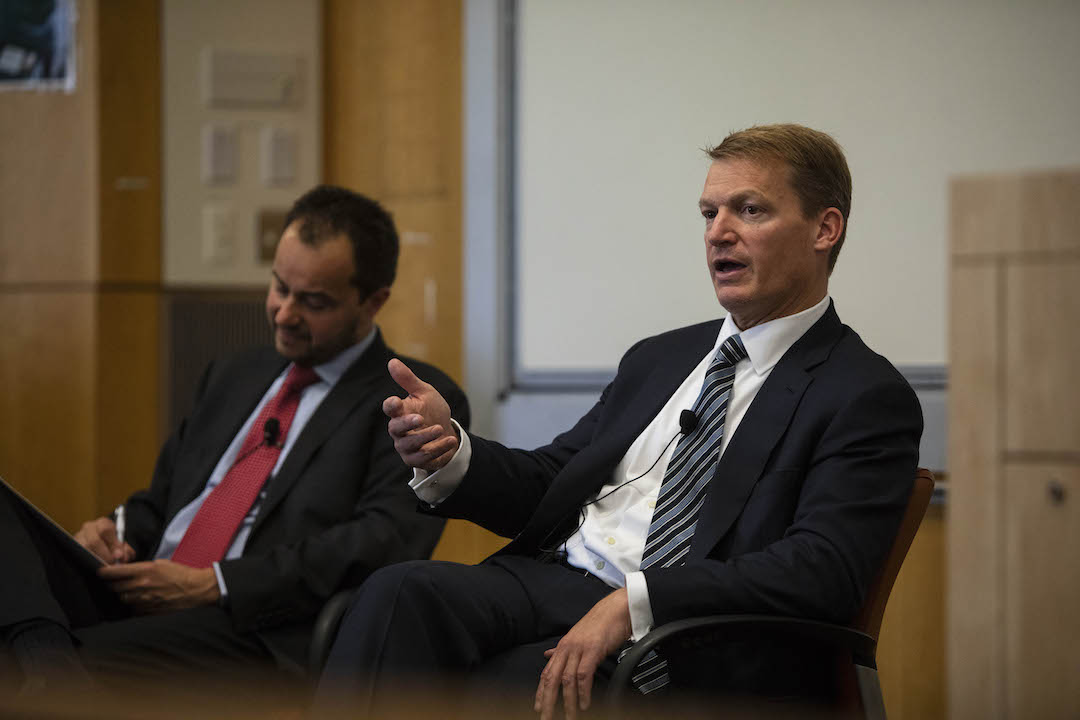By Kristen Mitchell
This month marks 17 years since a group of terrorists orchestrated an attack on the United States that killed thousands of Americans. Every year, national security officials use this time to take stock of how agencies have adapted to evolving threats and what more needs to be done, said Kirstjen Nielsen, secretary of the United States Department of Homeland Security (DHS).
“We’re many years from that pivotal moment that gave us a permanent mission at DHS, but we will not let time nor space dull our memories or weaken our resolve, nor can we afford to,” she said. “Especially with new storm clouds forming on the horizon.
Ms. Nielsen spoke at Jack Morton Auditorium on Wednesday as part of an event hosted by the GW Center for Cyber and Homeland Security. Ms. Nielsen, a former CCHS senior fellow, delivered remarks about cyber and physical threats facing the country, and what DHS is doing to meet those challenges under President Donald Trump.
DHS was created in 2002 in response to 9/11. The world has undergone historic changes since then, Ms. Nielsen said. The United States faces threats from state and non-state actors as more of our lives are wrapped up in digital networks where technology is rapidly changing. The result is a world where threats are more numerous, more widely distributed and difficult to root out.
The key to meeting these threats is building resilience and asserting American leadership. Ms. Nielsen said that under this administration the country is building “the toughest homeland security enterprise America has ever seen.”

Frank Cilluffo (left), CCHS director, speaks with Kirstjen Nielsen, secretary of homeland security, at Jack Morton Auditorium. (William Atkins/ GW Today)
Nefarious actors do not respect national borders, and the United States must continue to implement screening and vetting measures to help weed out violent extremists, Ms. Nielsen said. The United States also needs to acknowledge increasing threats from countries such as Russia, China, Iran and North Korea.
“We are witnessing the re-rise of the hostile nation state,” she said. “DHS has spent many years since 9/11 focused rightfully on non-state threats, but our nation-state rivals are increasingly asserting themselves in ways that endanger our homeland.”
The United States is facing threats from foreign adversaries at a level not seen since the Cold War, she said. Russia, in particular, worked to sow division and discord in the country leading up to the 2016 presidential election.
“Although no actual ballots were altered by this campaign, make no mistake, this was a direct attack on our democracy,” Ms. Nielsen said. “We should not, cannot and will not tolerate this or let it happen again.”
Ms. Nielsen said election security is one of her highest priorities, especially going into the midterm election this November. Ms. Nielsen was named DHS secretary last year by Mr. Trump, who has questioned intelligence agency findings that Russia interfered in the 2016 election.
In November, DHS will host a virtual ationwide “situation room” on Election Day to prevent and monitor any attacks on the democratic process. She called on every state to ensure that by 2020 they have redundant, auditable election systems.
“The best way to do that is with a physical paper trail and effective audits so that Americans everywhere can be assured that no matter what, their vote is counted, and it is counted correctly,” she said.
An important part of deterring threats to cyber networks is ensuring that any attacks are met with attribution and punishment, Ms. Nielsen said. The United States can no longer assume that nation states with cyber capabilities will simply choose not to use them. It must respond decisively to data theft and network penetration.
“Our adversaries have been warned,” she said. “The days of cyber surrender are over, and this administration is replacing complacency with consequences, replacing a nation’s deniability with accountability.”
Ms. Nielsen also called on Congress to give DHS the tools the agency needs to build on its cyber security arm and teased a bold, new counterterrorism strategy that will be released by the White House later this year.
Ms. Nielsen participated in a moderated discussion led by CCHS director Frank J. Cilluffo following her remarks.




